by: Nasir Al-Amin
Me: Conjit…Endemensh? (Beautiful…How are you?)
Her: {She smiles at my broken Amharic}
Me: Denanish? (How are you?)
Her: {In her soft barely audible voice she says:}Dena. (Fine)
Me: Ta-faish? (Where have you been?)
Her: {She begins to look down}
Me: What’s going on? Lately no one knows where you are? I send people to your house to check on you and not even your sister knows where you are?
Her: {She continues to stare at the floor}
Me: Talk to me… what’s up?
Me: Conjit…
Her: yes…
--Moments of silence--
Me: Something is going on? And maybe it’s my fault; you told me about your sister’s work {prostitution}, I came to your mother’s funeral, but….
--Moments of silence--
Me: Are you receiving the money I sent?
Me: Did your sister get you into this?
Her: {She continues to stare at the floor}
Me: What happened?
--Moments of silence--
Me: Tell me something. Everyone knew but me…it got to a point that I kept asking about you, but everyone was mute or fumbled on their words. No one wanted to tell me you’re doing this…
As I sit comfortably in the West faced with decisions of either Macchiato or Cappuccino; slacks from Banana Republic or H & M; Indian food, Ethiopian or Thai; during that same breath she made the decision… sell myself or die!
*I wrote this in response to finding out that a girl I met in Ethiopia, who lost both of her parents is now selling her body for cash as a means to secure her basic necessities!
Wednesday, December 20, 2006
Sunday, December 17, 2006
Mulu's Story
 Via: UNICEF
Via: UNICEFThirteen-year-old Mulu Melka’s soft voice and shy demeanour hide a character marked by courage, determination and steady nerves. When she was 11 years old, Mulu was abducted by a man who locked her up in his house for the night.
Click here to read Mulu's Story as well as the story of ther women!
Violence Against Girls in Africa
Violence Against Girls in Africa: A Retrospective Survey in Ethiopia, Kenya and Uganda
Via:CRIN
Summary:
On average, eight out of every ten girls surveyed in these reports are being physically abused by the people who they are supposed to trust most. Almost every girl will be psychologically abused in one way or another. And the majority of girls will be sexually abused (95% in Uganda, 85.2% in Kenya and 68.5% in Ethiopia).
Their mothers are tying them up. Their girlfriends are driving them into prostitution. Their teachers are psychologically abusing them. Their boyfriends are forcing them to have sex. Their brothers are kicking them. They witness their loved ones being beaten and even killed. In short, the girls representing the East African countries of Ethiopia, Kenya and Uganda are being denied their fundamental right to be a child.
Via:CRIN
Summary:
On average, eight out of every ten girls surveyed in these reports are being physically abused by the people who they are supposed to trust most. Almost every girl will be psychologically abused in one way or another. And the majority of girls will be sexually abused (95% in Uganda, 85.2% in Kenya and 68.5% in Ethiopia).
Their mothers are tying them up. Their girlfriends are driving them into prostitution. Their teachers are psychologically abusing them. Their boyfriends are forcing them to have sex. Their brothers are kicking them. They witness their loved ones being beaten and even killed. In short, the girls representing the East African countries of Ethiopia, Kenya and Uganda are being denied their fundamental right to be a child.
Sex Abuse of Girls Is Stubborn Scourge in Africa
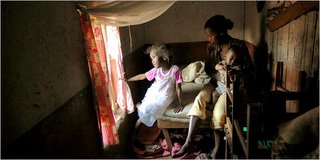 Via: NYtimes
Via: NYtimesSAMBAVA, Madagascar — Thirty miles outside this down-at-the-heels seaside town, Justin Betombo tends his vanilla plants and cheers the local soccer team as if he had not a care in the world. And in fact, what was once his greatest worry has been almost magically lifted from his shoulders. In the local prosecutor’s office, a file filled with accusations that he had sodomized his 9-year-old niece has vanished.
Mr. Betombo was arrested in 2003 after the girl, Kenia, said he had savagely assaulted her. The police obtained his confession, which he later recanted, and a doctor’s certificate that Kenia had been sexually violated, rendering her incontinent and anorexic. Twice they sent the case file to the prosecutor.
There matters ended. Mr. Betombo attended one hearing in the prosecutor’s office, but Kenia’s parents say they were not told about it. The records are nowhere to be found. And Mr. Betombo walked away a free man. Kenia’s parents, distressed by what they saw as a travesty of justice, asked that her name be published, hoping that her case would set an example.
Among sub-Saharan Africa’s children, such stories are disturbingly common. Even as this region races to adopt many of the developed world’s norms for children, including universal education and limits on child labor, one problem — child sexual abuse — remains stubbornly resistant to change.
Click here to read the entire article!
Monday, December 04, 2006
CIVIC ACTION FORUM MEETING & CAF DISCUSSION BOARD
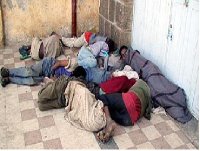 CIVIC ACTION FORUM MEETING & CAF DISCUSSION BOARD: GET INVOLVED TODAY!
CIVIC ACTION FORUM MEETING & CAF DISCUSSION BOARD: GET INVOLVED TODAY!Alif would like to invite you to its Civic Action Forum (CAF) that will convene this Friday, December 8th at 7PM. CAF is an action-oriented initiative that convenes monthly with the aim to move beyond mere dialogue and debate and into the development of tangible interventions to address critical issues faced by Ethiopia’s underserved and marginalized populations.
The location for the CAF meeting on Dec. 8th is Teachers College (Columbia University Campus) Russell Hall 3rd Floor, room 306.
Additionally, please join Alif online as it launches its online CAF Message Board for the Civic Action Forum (CAF). The six priority areas identified by the group are the following:
A Book Drive
The Hiwot (Life) Campaign
The Awakening Project
The Lalibela Project
Investing in Africa
Girls’ Education
The priority areas are not limited to these 6, thus your input is welcomed.
I hope to see each of you on both the CAF Discussion Board and at this weeks CAF meeting. Feel free to invite anyone you think might be interested in either of these action-oriented endeavors.
Click here to join the CAF Discussion Board
Sunday, December 03, 2006
THE AURA OF A PESSIMIST
 The Aura of a Pessimist
The Aura of a Pessimistby: Nasir Al-Amin
"The pessimist sees difficulty in every opportunity. The optimist sees the opportunity in every difficulty....” (Winston Churchill)
In times of difficulty, the optimist will spend his or her time thinking of ways to be an agent of change and the pessimist will spend his or her time talking! They both have a right to exist, but I also have the right to shield my soul and intellect from the aura of a pessimist, which siphons creativity, misguides the mind and cultivates a state of inertia.
“The world is a dangerous place, not because of those who do evil, but because of those who look on and do nothing....” (Albert Einstein)
Friday, December 01, 2006
A SINCERE COMMITMENT
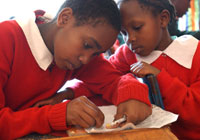 A SINCERE COMMITMENT ON WORLD AIDS Day
A SINCERE COMMITMENT ON WORLD AIDS DayAs we wind down from the arduous demands of this work week—appointments, assignments, travel and deadlines—let’s take a moment to reflect on what also occurred, albeit clandestinely:
This week in Ethiopia, approximately 5,000 new HIV infections will have been recorded, exacerbating an already dire situation marked by an estimated 2.8 million people infected and close to a million children orphaned by AIDS.
Twenty-five years after the first case of AIDS was recorded, let’s make World AIDS Day a day of commitment: a sincere commitment both in time and resources, to these 5,000 new HIV infections and a commitment to the 2.8 million people infected, as well as the children orphaned by AIDS. Ethiopia has one of the largest HIV/AIDS-affected populations in the world. The time to act is now!
Join Alif in its efforts to address the plight of orphans and vulnerable children in Ethiopia!
“Our lives begin to end the day we become silent about things that matter.”
(Martin Luther King Jr.)
Click here to make the Commitment Today!
Thursday, November 23, 2006
A Moment of Reflection on Thanksgiving
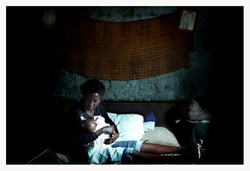 Thanksgiving & the Hiwot (Life) Campaign:
Thanksgiving & the Hiwot (Life) Campaign:by: Nasir Al-Amin
“Investing In Our Shared Future”
A Moment of Reflection on Thanksgiving
Thanksgiving offers not only a time for families and friends to gather, but also a time to remember and reflect on the vital possessions that we have such as food, shelter, health and physical security. Thus, as we end this day of gathering and reflection, lets take a moment to reflect on the plight of the 4.6 million orphans in Ethiopia; on the 30 percent of girls in Addis Ababa aged 10-14 that are not living with their parents, who were forced to run away from child marriages; lets reflect on the 8,000 sex workers that extreme poverty has forced into the sex trade; on the widowed mothers that earn $7.50 a month collecting trash, which is not enough to pay for food, rent and school fees. Make this Thanksgiving different, help Alif in its effort to contribute to a family’s effort to secure food, shelter and an education for their child.
Hiwot (Life) Campaign
Is an initiative to disengage 50 children from child labor, while simultaneously affording these 50 children with the opportunity to go to school and contribute financially to their family’s survival. Additionally, the cost of school fees, uniforms and school supplies are covered through the Hiwot Campaign, as well as each family is provided with $20 a month in an effort to aid them in securing their basic necessities: food, clothing and shelter.
Click here to join the Hiwot (Life) Campaign!
A Night of Networking and Purpose
 I would like to thank you all for joining Alif at Queen of Sheba Ethiopian Restaurant, for "A Night of Networking and Purpose,” on Saturday, November 18th in Alif's effort to raise awareness and funds for its Hiwot (Life) Campaign. The Hiwot (Life) Campaign is an initiative to send 50 orphans and vulnerable children to school in Ethiopia.
I would like to thank you all for joining Alif at Queen of Sheba Ethiopian Restaurant, for "A Night of Networking and Purpose,” on Saturday, November 18th in Alif's effort to raise awareness and funds for its Hiwot (Life) Campaign. The Hiwot (Life) Campaign is an initiative to send 50 orphans and vulnerable children to school in Ethiopia.Through your support Alif was able to raise enough funds to educate 4 children next year! Your contribution/investment to the Hiwot Campaign will have both an immediate and long-term effect on the life of a child and Ethiopia. The immediate effect of your contribution is actualized by a poor family’s ability to secure food, shelter and other basic necessities. The long-term effect, is seen in affording a child an education, which enhances a child’s and Ethiopia’s human capital, thus aiding in breaking the intergenerational transmission of poverty.
Again, I would like to extend a heartfelt thank you to all of you for attending and investing in a child’s life—Our Shared Future!
Sincerely,
Nasir
*Additionally, Alif would like to thank the owner of the Queen of Sheba Ethiopian Restaurant for affording Alif the opportunity to facilitate this event at the restaurant. For more information about Queen of Sheba click here!
Monday, November 06, 2006
Ethiopia: Steady increase in street children orphaned by AIDS
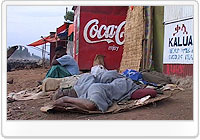 Via: UNICEF
Via: UNICEF“I have not seen one good thing about living on the street. Everything is horrible,”
(Mandefro Kassa, 14-year-old street child)
Ethiopia counts one of the largest populations of orphans in the world: 13 per cent of children throughout the country are missing one or both parents. This represents an estimated 4.6 million children – 800,000 of whom were orphaned by HIV/AIDS. The country has seen a steady increase in the number of children becoming orphaned because of AIDS. In the past, famine, conflict and other diseases were the main factors that claimed the lives of parents
Grim statistics
Many street children like Mandefro don’t have access to basic rights such as proper care, education, psychological support and supervision. Often, orphans and other vulnerable children are forced to work to earn an income. They are exposed to various forms of exploitation, including sexual exploitation.
In Addis Ababa more than 30 per cent of girls aged 10-14 are not living with their parents. Twenty per cent of these 30 per cent have run away from child marriages.
Twelve per cent of adolescents aged 10-14 – of the 30 per cent not living with their parents – surveyed in two areas of Addis Ababa were domestic workers. They are very young, very vulnerable to exploitation and abuse, and typically have no legal or social support.
In the Amhara region, the average age of marriage for girls is 14, while at the national level the mean age for marriage is 17. There are about 2.5 million children with disabilities.
No social net for vulnerable children
Very few government services help orphans. The primary coping strategy for communities has therefore been the extended family. Increasingly, however, the capacity of the extended family to support the growing numbers of orphans is declining.
“As more and more parents die, the capacity of the extended family to take care of orphans becomes smaller and smaller,” says Björn Ljungqvist, UNICEF Representative in Ethiopia. “In all countries where you have a big HIV/AIDS epidemic, at first you don’t see any orphans at all, as they are absorbed by the traditional systems. And then all of a sudden you seem to reach some type of breaking point and you start finding these children in the streets, you start finding them working in difficult conditions, you start finding even child-headed households.”
Click here to read entire article!
Meeting: Alif’s Civic Action Forum (CAF)
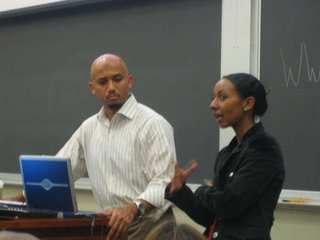 Alif would like to invite you to their Civic Action Forum (CAF) that will convene this Friday, November 10th at 7PM.
Alif would like to invite you to their Civic Action Forum (CAF) that will convene this Friday, November 10th at 7PM.CAF is an action-orientated initiative that convenes monthly with the aim to move beyond mere dialogue and debate and into the development of tangible interventions to address critical issues faced by Ethiopia’s underserved and marginalized populations.
Location:
Teachers College Main/Zankel Hall (Gottesman Library)
Room 306 (3rd Floor Russell Hall)
525 West 120th Street
Agenda
I. Open Floor Part I: Discussion on issues of interest.
(30 mins)
II. Open Floor Part II: Discussion of views on selected issues of interest.
(30 mins)
III. Group Formation: The establishment of groups based on common interest. (5 mins)
IV. Action: Development of action-orientated initiatives.
(30 mins)
V. Summation: Briefing from each group and agenda for next CAF (25 mins)
We look forward to seeing you this Friday!
*For more information contact Nasir at nasir@allianceinvestment.org
An Account of Street Life in Ethiopia (VIDEO)
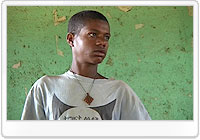 Via: UNICEF
Via: UNICEF“The street has been my home since I can remember. It’s been more than one year since I moved here (Bahr Dar) and all this time, I have not seen one good thing about living on the street. Everything is horrible,” says 14-year-old Mandefro Kassa, who grew up as an orphan on the streets of Woreta, a provincial town in Ethiopia.
Sunday, November 05, 2006
Forced Labor In a 6-Year-Old’s Eyes

Via: NY Times
KETE KRACHI, Ghana —
Just before 5 a.m., with the sky still dark over Lake Volta, Mark Kwadwo was rousted from his spot on the damp dirt floor. It was time for work.
Shivering in the predawn chill, he helped paddle a canoe a mile out from shore. For five more hours, as his coworkers yanked up a fishing net, inch by inch, Mark bailed water to keep the canoe from swamping.
He last ate the day before. His broken wooden paddle was so heavy he could barely lift it. But he raptly followed each command from Kwadwo Takyi, the powerfully built 31-year-old in the back of the canoe who freely deals out beatings. “I don’t like it here,” he whispered, out of Mr. Takyi’s earshot.
Mark Kwadwo is 6 years old. About 30 pounds, dressed in a pair of blue and red underpants and a Little Mermaid T-shirt, he looks more like an oversized toddler than a boat hand. He is too little to understand why he has wound up in this fishing village, a two-day trek from his home. But the three older boys who work with him know why. Like Mark, they are indentured servants, leased by their parents to Mr. Takyi for as little as $20 a year.
Until their servitude ends in three or four years, they are as trapped as the fish in their nets, forced to work up to 14 hours a day, seven days a week, in a trade that even adult fishermen here call punishing and, at times, dangerous.
Mr. Takyi’s boys — conscripts in a miniature labor camp, deprived of schooling, basic necessities and freedom — are part of a vast traffic in children that supports West and Central African fisheries, quarries, cocoa and rice plantations and street markets. The girls are domestic servants, bread bakers, prostitutes. The boys are field workers, cart pushers, scavengers in abandoned gem and gold mines.
By no means is the child trafficking trade uniquely African. Children are forced to race camels in the Middle East, weave carpets in India and fill brothels all over the developing world. The International Labor Organization, a United Nations agency, estimates that 1.2 million are sold into servitude every year in an illicit trade that generates as much as $10 billion annually.
Studies show they are most vulnerable in Asia, Latin America and Africa.
Africa’s children, the world’s poorest, account for roughly one-sixth of the trade, according to the labor organization. Data is notoriously scarce, but it suggests victimization of African children on a huge scale.
A 2002 study supervised by the labor organization estimated that nearly 12,000 trafficked children toiled in the cocoa fields of Ivory Coast alone. The children, who had no relatives in the area, cleared fields with machetes, applied pesticides and sliced open cocoa pods for beans.
Click here to read the entire article!
Forced Labor, In a 6-Year-Old’s Eyes
Photo journal: Ethiopia shoe-shine girl
Via: BBC
Interviews and photos: Amber Henshaw
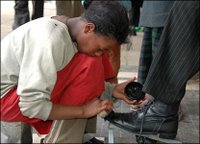 Easy
Easy
Meskerem, 12, is one of the few shoe-shine girls in Ethiopia's capital, Addis Ababa.
Her mother earns about $7.50 a month collecting rubbish, which is not enough to pay for food, rent and school fees.
At first Meskerem wanted to work as a domestic servant but she was advised to try shoe-shining. She likes being self-employed.
"Shoe shining is not difficult. It is easy for me because I have the power. If I want to work I can work," she says.
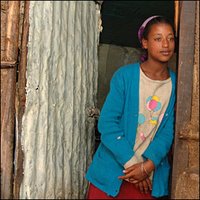 Shanty town
Shanty town
Meskerem lives with her mother, her uncle and four siblings in a one-roomed mud shack in the city centre.
It’s in a sprawling shanty area just behind the five-star Sheraton Hotel.
Meskerem’s father died just over a year ago.
Drunk
Meskerem’s mother, Bercha Yanaga, 29, says life was hard when Meskerem was younger.
"When she was a child I raised her in difficult conditions but now she’s growing up and helping me I feel so happy.
"My husband was a drunk and we were fighting about money all the time."
He died when Tigist, right, now two years old, was just a few months old.
Threats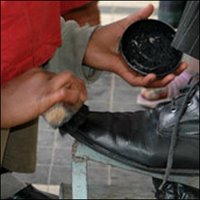
Meskerem shines shoes after school and all day at the weekend.
She charges 1 birr (11 US cents) to clean a pair of shoes. On a good day at the weekend she can earn between 5 to 7 birr.
"When I first started the boys came up to me and told me to go away," she says.
"They told me they would earn less because I was a girl and men would prefer to come to me. The boys threatened me. Sometimes customers and passers-by insult me and make me cry."
Long day
"I wake up just before 0700 and go to a food centre. If they have food I have breakfast, if not I just go home.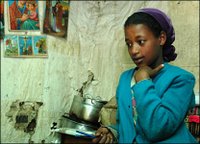
My mother leaves home for work at 0600 and gets back at 0800. I sweep the floor and do other chores until she returns.
Then I go to school until 12.30 and come home for lunch. If there’s lunch I eat, if not I go back to school for the afternoon session, which lasts until 1530.
Then I go home to collect my shoe shine boxes and work until 1800. Then I sleep.
Knowledge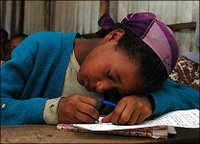
Meskerem uses some of the money she earns to pay her school fees - of 15 birr ($1.65) a month.
"I had to go to school because I want to get knowledge - knowledge is how you become somebody," she says.
She hopes to become a teacher one day.
Admire
The government and donors are trying to increase the number of girls who go to school in Ethiopia.
Muluembet Gebereyes is the head teacher at Meskerem's school.
"There are more girls than boys at this school, which is private," she says.
"The boys go to other schools and the girls go here because it is close to their homes. Parents worry about girls getting abducted [as brides] so they like to keep an eye on them. It is unusual for girls to shine shoes. I admire Meskerem very much.
Frightened
"Sometimes I play with my friends and my sister Guenet, 9, (far right)when I came back from work at the weekend.
"I am frightened that bad things will happen to me if I leave the compound, so I always stay here to play," Meskerem says.
"Once I tried to teach her how to shine shoes too and I wanted to buy her a box and some materials but she couldn’t do it, so I am the only one in the family shining shoes."
*Click here to see the rest of the pictures and interview!
Interviews and photos: Amber Henshaw
 Easy
EasyMeskerem, 12, is one of the few shoe-shine girls in Ethiopia's capital, Addis Ababa.
Her mother earns about $7.50 a month collecting rubbish, which is not enough to pay for food, rent and school fees.
At first Meskerem wanted to work as a domestic servant but she was advised to try shoe-shining. She likes being self-employed.
"Shoe shining is not difficult. It is easy for me because I have the power. If I want to work I can work," she says.
 Shanty town
Shanty townMeskerem lives with her mother, her uncle and four siblings in a one-roomed mud shack in the city centre.
It’s in a sprawling shanty area just behind the five-star Sheraton Hotel.
Meskerem’s father died just over a year ago.
Drunk

Meskerem’s mother, Bercha Yanaga, 29, says life was hard when Meskerem was younger.
"When she was a child I raised her in difficult conditions but now she’s growing up and helping me I feel so happy.
"My husband was a drunk and we were fighting about money all the time."
He died when Tigist, right, now two years old, was just a few months old.
Threats

Meskerem shines shoes after school and all day at the weekend.
She charges 1 birr (11 US cents) to clean a pair of shoes. On a good day at the weekend she can earn between 5 to 7 birr.
"When I first started the boys came up to me and told me to go away," she says.
"They told me they would earn less because I was a girl and men would prefer to come to me. The boys threatened me. Sometimes customers and passers-by insult me and make me cry."
Long day
"I wake up just before 0700 and go to a food centre. If they have food I have breakfast, if not I just go home.

My mother leaves home for work at 0600 and gets back at 0800. I sweep the floor and do other chores until she returns.
Then I go to school until 12.30 and come home for lunch. If there’s lunch I eat, if not I go back to school for the afternoon session, which lasts until 1530.
Then I go home to collect my shoe shine boxes and work until 1800. Then I sleep.
Knowledge

Meskerem uses some of the money she earns to pay her school fees - of 15 birr ($1.65) a month.
"I had to go to school because I want to get knowledge - knowledge is how you become somebody," she says.
She hopes to become a teacher one day.
Admire
The government and donors are trying to increase the number of girls who go to school in Ethiopia.
Muluembet Gebereyes is the head teacher at Meskerem's school.
"There are more girls than boys at this school, which is private," she says.
"The boys go to other schools and the girls go here because it is close to their homes. Parents worry about girls getting abducted [as brides] so they like to keep an eye on them. It is unusual for girls to shine shoes. I admire Meskerem very much.
Frightened
"Sometimes I play with my friends and my sister Guenet, 9, (far right)when I came back from work at the weekend.
"I am frightened that bad things will happen to me if I leave the compound, so I always stay here to play," Meskerem says.
"Once I tried to teach her how to shine shoes too and I wanted to buy her a box and some materials but she couldn’t do it, so I am the only one in the family shining shoes."
*Click here to see the rest of the pictures and interview!
Saturday, October 28, 2006
Launching of Hiwot (Life) Campaign
 I want to thank you all for attending the launching the Hiwot (Life) Campaign on Friday, October 27th, as the Hiwot Campaign is one stage in a vision I have to create change in the lives of orphans and vulnerable children in Ethiopia. The essence of this vision is to alter the lives of children who have brought clarity to my life.
I want to thank you all for attending the launching the Hiwot (Life) Campaign on Friday, October 27th, as the Hiwot Campaign is one stage in a vision I have to create change in the lives of orphans and vulnerable children in Ethiopia. The essence of this vision is to alter the lives of children who have brought clarity to my life.Through the Hiwot Campaign, Alif aims to send 50 orphans and vulnerable children to school next year. However, in addition to giving these 50 children the opportunity to obtain an education, the Hiwot Campaign’s dual impact, both an immediate and long-term effect on the lives of children and Ethiopia, is the vital component of the campaign.
This initiative provides poor family’s the ability to secure food, shelter and other basic necessities, which address the immediate impact of poverty. The long-term effect of the Hiwot Campaign, is seen in affording a child an education, which enhances a child’s and Ethiopia’s human capital, thus aiding in breaking the generational cycle/transmission of poverty.
Join the Hiwot Campaign and let’s change lives by investing in a child’s education and future!
I thank you again for attending and your interest in the Hiwot Campaign,
Nasir
Click here to join the Hiwot Campaign!
Sunday, October 22, 2006
ETHIOPIA: Nearly half of the children orphaned by HIV/AIDS
Via: PLUSNEWS
Ethiopia has one of the largest populations of orphans in the world with nearly half of the children having lost at least one of their parents. A government official said on Tuesday that HIV/AIDS, disease, hunger and poverty threatened to drive the number of orphaned children from 11 percent to 43 percent of the 45 million children in Ethiopia by 2010.
This could mean some 19 million children will have lost one or both of their parents, according to the figures, said Bulti Gutema, the head of the government's taskforce on the problem of orphans and vulnerable children. He said the figures were based on projections by the health ministry.
Bulti said antiretroviral drugs are vital in curbing the explosion but less than five percent got the drugs. Cheap antibiotics costing less than US $0.03 cents could also cut the numbers of child deaths from HIV/AIDS in the country by half but less than one per cent of the children got them, he added."This is a huge problem," he said at the launch of a new initiative to highlight the problem and bridge the massive funding gap that exists.
The UN Children's Fund (UNICEF) estimate that looking after each orphaned child in Ethiopia would cost around $300 a year, totalling some $1.38 billion. But the organisation has less than $10 million available even though Ethiopia has one of the largest populations of orphans in the world. Some 300,000 children already live on the streets, according to the UN body.Bjorn Ljungqvist, head of UNICEF Ethiopia said the scale of the crisis was daunting.
"It is easy to stand and look at the problem from a distance and wring our hands at how big and impossible the problem is," he said. "But we must confront this."
The warning came as UNICEF launched a global campaign focusing on the enormous impact of HIV/AIDS on children. Worldwide, fewer than five percent of HIV-positive children receive treatment and millions of children who have lost parents to the disease go without support. There are currently 4.6 million orphans in Ethiopia - with around 540,000 of them having been orphaned by the HIV/AIDS pandemic.
Ethiopia has one of the largest populations of orphans in the world with nearly half of the children having lost at least one of their parents. A government official said on Tuesday that HIV/AIDS, disease, hunger and poverty threatened to drive the number of orphaned children from 11 percent to 43 percent of the 45 million children in Ethiopia by 2010.
This could mean some 19 million children will have lost one or both of their parents, according to the figures, said Bulti Gutema, the head of the government's taskforce on the problem of orphans and vulnerable children. He said the figures were based on projections by the health ministry.
Bulti said antiretroviral drugs are vital in curbing the explosion but less than five percent got the drugs. Cheap antibiotics costing less than US $0.03 cents could also cut the numbers of child deaths from HIV/AIDS in the country by half but less than one per cent of the children got them, he added."This is a huge problem," he said at the launch of a new initiative to highlight the problem and bridge the massive funding gap that exists.
The UN Children's Fund (UNICEF) estimate that looking after each orphaned child in Ethiopia would cost around $300 a year, totalling some $1.38 billion. But the organisation has less than $10 million available even though Ethiopia has one of the largest populations of orphans in the world. Some 300,000 children already live on the streets, according to the UN body.Bjorn Ljungqvist, head of UNICEF Ethiopia said the scale of the crisis was daunting.
"It is easy to stand and look at the problem from a distance and wring our hands at how big and impossible the problem is," he said. "But we must confront this."
The warning came as UNICEF launched a global campaign focusing on the enormous impact of HIV/AIDS on children. Worldwide, fewer than five percent of HIV-positive children receive treatment and millions of children who have lost parents to the disease go without support. There are currently 4.6 million orphans in Ethiopia - with around 540,000 of them having been orphaned by the HIV/AIDS pandemic.
ETHIOPIA: Poverty forcing girls into risky sex work
Via: IRIN
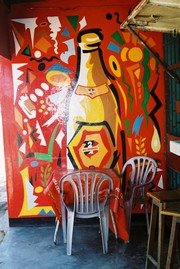 The nightclubs of the Ethiopian capital, Addis Ababa, reveal a thriving sex industry, in which thousands of skimpily dressed young women trade sexual favours for cash to survive, putting them at risk of contracting HIV and spreading the disease.
The nightclubs of the Ethiopian capital, Addis Ababa, reveal a thriving sex industry, in which thousands of skimpily dressed young women trade sexual favours for cash to survive, putting them at risk of contracting HIV and spreading the disease.
Extreme poverty has forced many girls into the sex trade. Helen Chane (not her real name), a grade 10 student aged 17, became a commercial sex worker after her parents died from AIDS-related illnesses about a year ago.
"I support my grandmother and sister; I sleep with students during the day and I have customers that I find through brokers at night," she said. "I do not need to go to the street, the brokers bring them to me."
Sex work in Addis is usually linked to establishments such as restaurants, bars, hotels and nightclubs frequented by wealthy expatriates or local businessmen, but the city also has residential houses that function as unlicensed brothels.
According to a 2002 census in Addis by the American healthcare agency, Family Health International (FHI), 8,134 establishment-based sex workers were identified in the capital, 60 percent of whom were aged between 15 and 24. Clients are increasingly targeting high school students, domestic workers and even children - the perception is that these groups are less likely to have the HI virus than those openly selling sex.
Click here to read the entire article!
 The nightclubs of the Ethiopian capital, Addis Ababa, reveal a thriving sex industry, in which thousands of skimpily dressed young women trade sexual favours for cash to survive, putting them at risk of contracting HIV and spreading the disease.
The nightclubs of the Ethiopian capital, Addis Ababa, reveal a thriving sex industry, in which thousands of skimpily dressed young women trade sexual favours for cash to survive, putting them at risk of contracting HIV and spreading the disease.Extreme poverty has forced many girls into the sex trade. Helen Chane (not her real name), a grade 10 student aged 17, became a commercial sex worker after her parents died from AIDS-related illnesses about a year ago.
"I support my grandmother and sister; I sleep with students during the day and I have customers that I find through brokers at night," she said. "I do not need to go to the street, the brokers bring them to me."
Sex work in Addis is usually linked to establishments such as restaurants, bars, hotels and nightclubs frequented by wealthy expatriates or local businessmen, but the city also has residential houses that function as unlicensed brothels.
According to a 2002 census in Addis by the American healthcare agency, Family Health International (FHI), 8,134 establishment-based sex workers were identified in the capital, 60 percent of whom were aged between 15 and 24. Clients are increasingly targeting high school students, domestic workers and even children - the perception is that these groups are less likely to have the HI virus than those openly selling sex.
Click here to read the entire article!
Tuesday, October 10, 2006
An Overview of Adolesence in Ethiopia
ADOLESENCE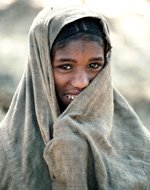
Via: Unicef
Adolescence is a critical stage of development, a transition from childhood to adult, a period marked by physical, emotional and social changes. Ethiopian face the challenges of adolescence.
• An estimated 2.3 million Ethiopians are infected with HIV and close to 1.2 million are HIV/AIDS orphans
• Poverty, about 82 per cent of the population survives on less than 1dollar a day.
• Harmful traditional practices (HTPs). Abduction and early marriage are widely practiced in most parts of rural Ethiopia. Female genital mutilation (FGM) contributes to the spread of HIV/AIDS.
• Nearly 4.9 million adolescents aged 15-18, of which 2.4 million are girls, are not enrolled in school due to various economic and social reasons
• For the entire working population, unemployment rates are highest in the 15-19 age groups. For all age groups, females constitute the majority of the unemployed. The high level of unemployment has serious implications for the types of lifestyle choices made by adolescence, increasing the risk of alcohol and drug abuse, unwanted pregnancy, multiple sexual partners, and HIV infections.
• There are between 150,000–200,000 street children nationally, with a further one million vulnerable or at risk of ending up on the streets. Girls who work and live in the streets face sexual abuse by adults, rape, unwanted pregnancy and early motherhood – sometimes as young as 12. These girls are likely to join the rank of child prostitutes or street mothers and continue the vicious circle of street life. Inevitably they are highly at risk of being infected with HIV/AIDS. It is estimated that there are 10,000 street mothers in Addis Ababa.

Via: Unicef
Adolescence is a critical stage of development, a transition from childhood to adult, a period marked by physical, emotional and social changes. Ethiopian face the challenges of adolescence.
• An estimated 2.3 million Ethiopians are infected with HIV and close to 1.2 million are HIV/AIDS orphans
• Poverty, about 82 per cent of the population survives on less than 1dollar a day.
• Harmful traditional practices (HTPs). Abduction and early marriage are widely practiced in most parts of rural Ethiopia. Female genital mutilation (FGM) contributes to the spread of HIV/AIDS.
• Nearly 4.9 million adolescents aged 15-18, of which 2.4 million are girls, are not enrolled in school due to various economic and social reasons
• For the entire working population, unemployment rates are highest in the 15-19 age groups. For all age groups, females constitute the majority of the unemployed. The high level of unemployment has serious implications for the types of lifestyle choices made by adolescence, increasing the risk of alcohol and drug abuse, unwanted pregnancy, multiple sexual partners, and HIV infections.
• There are between 150,000–200,000 street children nationally, with a further one million vulnerable or at risk of ending up on the streets. Girls who work and live in the streets face sexual abuse by adults, rape, unwanted pregnancy and early motherhood – sometimes as young as 12. These girls are likely to join the rank of child prostitutes or street mothers and continue the vicious circle of street life. Inevitably they are highly at risk of being infected with HIV/AIDS. It is estimated that there are 10,000 street mothers in Addis Ababa.
OVERVIEW OF PRIMARY SCHOOL YEARS--ETHIOPIA
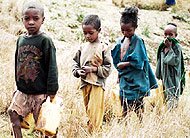 The Primary School Years
The Primary School Yearsvia: Unicef
The primary school age population is estimated to be almost 14 million in 2002/2003 which is about one fifth of the total population. About 36.6 per cent of the school age population is not enrolled in primary schools.
Primary school years in Ethiopia are characterised by:
• Low enrollment and attendance; high repetition and drop outs
o Though primary schooling in Ethiopia is free for the average Ethiopian living below one dollar a day it is difficult to cover their families’ school expenses like uniforms, exercise books and school maintenance cost
o Families may be reluctant to send their children to school, since they depend on their children’s labour for survival. Family do not understand the value of sending their children to school.
o About 72 per cent of school-age children have no access to formal education.
o The net primary enrollment ratio at the national level was 54 per cent in 2002/2003 with an average growth rate of 11.3 per cent over the last 5 years. The net enrollment ratio is 47.2 per cent for girls and 60.6 per cent for girls. Net primary attendance is even lower.
• Disparities
o More than 60 per cent of primary school children did not have the chance to continue to grade 5. Girls’ repetition and drop out rates are higher than boys.
o Girls’ participation is lower than boys for all regions except the capital city Addis Ababa. Nationally the female and male enrollment in 2002/2003 is 0.7.
• Resources and facilities
o Nationally, only 3 per cent of Ethiopia’s schools have clinics serving students. About 75 per cent of the population suffer from some form of communicable disease.
o Primary school children have to walk long distances and through difficult terrain to attend school often in crowded classroom, inadequate trained teachers, school materials. Without proper sanitation, in four out of 10 children will not reach their full educational potential.
o Play grounds are basically nonexistent in Ethiopia, though play have a significant role in the primary years of life and helps children develop socially, emotionally and intellectually.
o A demographic and Health Survey conducted in 2000 found that 55 per cent of Ethiopian children under the age of five are stunted due to malnutrition.
Sunday, October 08, 2006
Inner Agitation: An Alarm is the Precursor to Awakening
Inner Agitation: An Alarm is the Precursor to Awakening
by: Nasir Al-Amin
Internally there is something unnerving about the plight of orphans and vulnerable children in Ethiopia. Their reality is one of exploitation, abuse and violence. “I refuse to call it a life,” 17 year old Fronyi of Ethiopia asserts, after recounting how she turned to prostitution in order to survive. However, Fronyi’s account is a composite of the 1.2 million children who are victims of sexual exploitation annually.
Often people ask me “how did you get involved in this” or “Why Ethiopia.” Although I never completely answer the question, due to time and complexity, one of the many reasons and/or answers to “How” and Why Ethiopia” is this inner agitation that accompanies my thoughts and reflections about the condition of women and children I have met during my travels to Ethiopia. It appears/feels like this inner agitation has enhanced over the years—the more I travel to Ethiopia, learn about orphans and vulnerable children, and actually develop relationships with them the more unnerving this agitation becomes.
I’m convinced that this inner agitation is what gives sound to the inner voice in all of us who have witnesses something in our lives that is unsettling. Through a defeatist mentality (“Oh this is just how things are”, “I’m only one person, what can I do,” “The government…”) and conspicuous consumption (efforts to amass material items for vain reasons only to distract the mind and spirit from an uncomforting reality) we try to silence that voice, yet it is this voice that is the precursor to an inner awakening.
For me that inner agitation and voice awakened this sense that what I’m witnessing in Ethiopia is unacceptable. And that realization is at the heart of why I established Alif (Alliance Investment Fund) and is the impetus to continue this work. As the awakening was not through engaging concepts, theories, or reading annual reports rather it came via interactions with orphans and vulnerable children, through taking the time to not only give them a birr (Ethiopian currency) but also taking the time to ask them about their life: What stops you from attending school? What lead you to prostitution as a teenager? Are your parents alive? Who cares for you? What do you want to be when you grow up? Engaging people, developing relationships is not just giving someone money because he or she is begging. I know an Ethiopian guy that when he went back to Ethiopia, he would look for this shoeshine boy that he developed a rapport with, so daily he would go to the street where he works and sit and talk to him. That shows concern, and gives the voiceless a voice.
So it is the inner voice that serves as an alarm, letting one know that the plight of orphans and vulnerable children in Ethiopia is unacceptable and that one should make a concerted effort to affect change. If its just one child that you send to school, then that’s commendable as we never know where the path of education would lead that child or the number of lives that child will affect in the future, or if you organize a group of family members, collogues, and friends to contribute to the construction of a school in Ethiopia or securing the school uniforms and supplies for 10 or 20 children. The crux is to stop silencing the alarm, the inner voice, as the wretched plight of orphans and vulnerable children in Ethiopia need you to listen.
by: Nasir Al-Amin
Internally there is something unnerving about the plight of orphans and vulnerable children in Ethiopia. Their reality is one of exploitation, abuse and violence. “I refuse to call it a life,” 17 year old Fronyi of Ethiopia asserts, after recounting how she turned to prostitution in order to survive. However, Fronyi’s account is a composite of the 1.2 million children who are victims of sexual exploitation annually.
Often people ask me “how did you get involved in this” or “Why Ethiopia.” Although I never completely answer the question, due to time and complexity, one of the many reasons and/or answers to “How” and Why Ethiopia” is this inner agitation that accompanies my thoughts and reflections about the condition of women and children I have met during my travels to Ethiopia. It appears/feels like this inner agitation has enhanced over the years—the more I travel to Ethiopia, learn about orphans and vulnerable children, and actually develop relationships with them the more unnerving this agitation becomes.
I’m convinced that this inner agitation is what gives sound to the inner voice in all of us who have witnesses something in our lives that is unsettling. Through a defeatist mentality (“Oh this is just how things are”, “I’m only one person, what can I do,” “The government…”) and conspicuous consumption (efforts to amass material items for vain reasons only to distract the mind and spirit from an uncomforting reality) we try to silence that voice, yet it is this voice that is the precursor to an inner awakening.
For me that inner agitation and voice awakened this sense that what I’m witnessing in Ethiopia is unacceptable. And that realization is at the heart of why I established Alif (Alliance Investment Fund) and is the impetus to continue this work. As the awakening was not through engaging concepts, theories, or reading annual reports rather it came via interactions with orphans and vulnerable children, through taking the time to not only give them a birr (Ethiopian currency) but also taking the time to ask them about their life: What stops you from attending school? What lead you to prostitution as a teenager? Are your parents alive? Who cares for you? What do you want to be when you grow up? Engaging people, developing relationships is not just giving someone money because he or she is begging. I know an Ethiopian guy that when he went back to Ethiopia, he would look for this shoeshine boy that he developed a rapport with, so daily he would go to the street where he works and sit and talk to him. That shows concern, and gives the voiceless a voice.
So it is the inner voice that serves as an alarm, letting one know that the plight of orphans and vulnerable children in Ethiopia is unacceptable and that one should make a concerted effort to affect change. If its just one child that you send to school, then that’s commendable as we never know where the path of education would lead that child or the number of lives that child will affect in the future, or if you organize a group of family members, collogues, and friends to contribute to the construction of a school in Ethiopia or securing the school uniforms and supplies for 10 or 20 children. The crux is to stop silencing the alarm, the inner voice, as the wretched plight of orphans and vulnerable children in Ethiopia need you to listen.
Friday, October 06, 2006
Civic Action Forum (CAF)
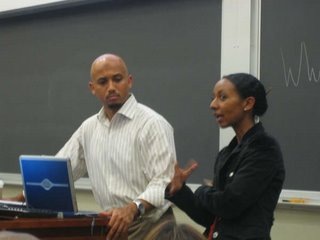 Alif’s Civic Action Forum (CAF)
Alif’s Civic Action Forum (CAF)CAF is an action-orientated initiative that convenes monthly with the aim to move beyond mere dialogue and debate and into the development of tangible interventions to address critical issues faced by Ethiopia’s underserved and marginalized populations.
CAF will convene on or within the area of Columbia University, however time and location will be updated on the Alif site: (www.allianceinvestment.org).
We look forward to seeing you at CAF meetings!
Tuesday, October 03, 2006
DOCUMENTARY: "AFRICA OPEN FOR BUSINESS"
The SIPA Pan-African Network of Columbia University,
WNET, and The Africa-America Institute
Present
WNET, and The Africa-America Institute
Present
A DOCUMENTARY SCREENING AND PANEL DISCUSSION
"AFRICA OPEN FOR BUSINESS"
Ten stories, one continent, a global world.
Get ready to see Africa as you’ve never seen it before
Thursday October 12th, 2006
6pm – 8pm
Venue: Columbia University, Roone Arledge Auditorium
1st Floor Lerner Hall (2920 Broadway, New York, NY 10027)
RSVP by October 5th: http://sipa.columbia.edu/students/span/
Co-sponsored by The Africa Program at SIPA, Africana Association (Columbia Business School)
"Africa Open for Business" is the award-winning film that is changing people’s
perceptions on Africa. Carol Pineau, the producer of this groundbreaking film
that screened at the World Economic Forum and Cannes Film Festival, will talk
about a new vision for Africa. The film will be followed by a panel discussion with
leading experts, including investors who have literally made millions in African
stock exchanges, regularly topping the list of the world's fastest growing markets.
perceptions on Africa. Carol Pineau, the producer of this groundbreaking film
that screened at the World Economic Forum and Cannes Film Festival, will talk
about a new vision for Africa. The film will be followed by a panel discussion with
leading experts, including investors who have literally made millions in African
stock exchanges, regularly topping the list of the world's fastest growing markets.
Sunday, October 01, 2006
The Blueprint
THE BLUEPRINT—How to move beyond Rhetoric, and Passionate but Impotent Discourse about the Government and move to Tangible Solutions
By: Nasir Al-Amin
Typically, the Christmas Season and New Years creates a wave of Ethiopians from the diaspora traveling back to Ethiopia for the festive seasons. In most cases, those who journey back to Ethiopia allocate their time in two ways. The first way, is the initial few days and/or week are allocated to visiting various family members. The second way/or second segment of their time is allocated to clubbing everyday into the AM and then sleeping until 12 or 1 PM. As well as making week/weekend excursions to So-daray and Lunganew. However, traveling back to Ethiopia is bigger than that, it’s bigger than Bole, the nightlife, and weekend excursions to So-daray and Lunganew, thus I’m writing to offer a third and/or an alternative to the latter allocation of time spent in Ethiopia. It is an alternative that is life altering, and engenders clarity to ones purpose in life.
Therefore, this alternative I call the Blueprint. And the Blueprint is a commitment that your trip to Ethiopia will be one of purpose one that will touch the lives of others. This is done by making site visits to various Non-Governmental Organizations (NGO) in Ethiopia who are providing services to poor women and children, people infected or affected by HIV/AIDS, shelters/drop in-centers for street children, alternative/non-formal education programs, and interventions for orphans.
There are numerous benefits to taking on this commitment. One, it would raise your personal awareness about the plight of vulnerable populations in Ethiopia as well as the services being afforded them. Two, you would be able to come back to your community, college/university, ESA, or place of employment equipped to speak with confidence and insight about the realties on the ground in Ethiopia, as well as arrange awareness and fundraising events for NGOs that you previously visited—it would be a trickle down effect, as those close to you would trust that if you are willing to spend your time and contribute financially to a particular NGO then they should as well. Third, those who are interested in education could visit schools in Ethiopia and return with interviews you conducted with the teachers and students that would serve as a stimulus for establishing a BACK TO SCHOOL campaign that would serve to raise awareness as well as secure vital supplies for children in Ethiopia: backpacks, school uniforms and supplies. Fourth, and maybe arguably the most important, it would show the marginalized and impoverished women and children that Ethiopians of the diaspora care—I know some like to think that every Ethiopian in Ethiopia knows that their brothers and sisters abroad care about their well being, but that’s a fallacy, I have spoken with some of the underserved women and children and they feel forgotten by their brothers and sister in the diaspora. *(I know that statement and the following will engender a bit of hate mail but I’m fine with that.) Furthermore, I’m not referring to that emotional feeling of care and concern, I’m talking about the tangible care and concern that moves one beyond rhetoric and into action, as impotent café rhetoric doesn’t get the little girl who dropped out of school due to a lack of funds for a school uniform and supplies back in school, nor does it afford the mother of the shoeshine boy enough money to feed herself and his siblings.
So here are the logistics of the Blueprint: I have attached a document (click on the title or the link below) that details the NGOs working in Ethiopia and on the side panel of this blog under the section Ethiopian NGOs click on the link: Index of NGOs working. Today, is October 1st, for one month you could search the two sites and look at the work and populations served (orphans, HIV/AIDS infected and/or affected women and children, street children…etc) by the various NGOs and in November contact the NGOs via phone and/or e-mail. During the contact all you have to mention is the following: I’m an Ethiopian living in __________ I plan to visit Ethiopia during the month of December. I want to learn more about the work you do can I visit your location?
It’s that simple! I know some of you are saying the problems faced by Ethiopia are bigger than that and are not that simple. A note to you:
“Though primary schooling in Ethiopia is free, for the average Ethiopian living below one dollar a day it is difficult to cover their families’ school expense like uniforms, exercise books and school maintenance cost.”
“Nearly 4.9 million adolescents aged 15-18, of which 2.4 million are girls, are not enrolled in school due to various economic and social reasons.”
“More than 60 percent of primary school children did not have the chance to continue to grade 5.”
“The largest single reason for non-attendance (69%) was that parents could not afford school fees. A lack of school materials, the second biggest reason (29%), was related; families simply couldn’t afford to by basic supplies such as uniforms, books, pens and papers.”
So sometimes the solutions are very simple!
Back to the Blueprint, I know its that simple because I did it and each NGO that I contacted was excited to have me visit and learn more about the plight of those they serviced and ways in which I could help. However, it is critical that before you depart, set tentative dates with each NGO that you plan to visit as the allure of Addis’s nightlife can only be combated with a detailed To Do List of things you must accomplish while in Addis.
An estimated 82% of Ethiopia’s population survives on less than 1 dollar a day. If you follow the Blueprint you will come in contact with this segment of the population and your life will be changed. The blinders will be removed and your reality and discourse about Ethiopia will have been altered. At that point, your words will move beyond impotent rhetoric and will be able to empower those around you and affect change in the lives of Ethiopia’s most vulnerable.
This piece was inspired by someone who has shared with me her commitment to make her next venture to Ethiopia one of purpose. I know that there are a number of you who make this commitment each time you return to Ethiopia, however this was written for those of you who don’t make the commitment or those of you who are questioning how to do what internally you feel compelled to do. Make your next trip to Ethiopia one of purpose and meaning!
Nasir Al-Amin
Click here for link to NGOs!
By: Nasir Al-Amin
Typically, the Christmas Season and New Years creates a wave of Ethiopians from the diaspora traveling back to Ethiopia for the festive seasons. In most cases, those who journey back to Ethiopia allocate their time in two ways. The first way, is the initial few days and/or week are allocated to visiting various family members. The second way/or second segment of their time is allocated to clubbing everyday into the AM and then sleeping until 12 or 1 PM. As well as making week/weekend excursions to So-daray and Lunganew. However, traveling back to Ethiopia is bigger than that, it’s bigger than Bole, the nightlife, and weekend excursions to So-daray and Lunganew, thus I’m writing to offer a third and/or an alternative to the latter allocation of time spent in Ethiopia. It is an alternative that is life altering, and engenders clarity to ones purpose in life.
Therefore, this alternative I call the Blueprint. And the Blueprint is a commitment that your trip to Ethiopia will be one of purpose one that will touch the lives of others. This is done by making site visits to various Non-Governmental Organizations (NGO) in Ethiopia who are providing services to poor women and children, people infected or affected by HIV/AIDS, shelters/drop in-centers for street children, alternative/non-formal education programs, and interventions for orphans.
There are numerous benefits to taking on this commitment. One, it would raise your personal awareness about the plight of vulnerable populations in Ethiopia as well as the services being afforded them. Two, you would be able to come back to your community, college/university, ESA, or place of employment equipped to speak with confidence and insight about the realties on the ground in Ethiopia, as well as arrange awareness and fundraising events for NGOs that you previously visited—it would be a trickle down effect, as those close to you would trust that if you are willing to spend your time and contribute financially to a particular NGO then they should as well. Third, those who are interested in education could visit schools in Ethiopia and return with interviews you conducted with the teachers and students that would serve as a stimulus for establishing a BACK TO SCHOOL campaign that would serve to raise awareness as well as secure vital supplies for children in Ethiopia: backpacks, school uniforms and supplies. Fourth, and maybe arguably the most important, it would show the marginalized and impoverished women and children that Ethiopians of the diaspora care—I know some like to think that every Ethiopian in Ethiopia knows that their brothers and sisters abroad care about their well being, but that’s a fallacy, I have spoken with some of the underserved women and children and they feel forgotten by their brothers and sister in the diaspora. *(I know that statement and the following will engender a bit of hate mail but I’m fine with that.) Furthermore, I’m not referring to that emotional feeling of care and concern, I’m talking about the tangible care and concern that moves one beyond rhetoric and into action, as impotent café rhetoric doesn’t get the little girl who dropped out of school due to a lack of funds for a school uniform and supplies back in school, nor does it afford the mother of the shoeshine boy enough money to feed herself and his siblings.
So here are the logistics of the Blueprint: I have attached a document (click on the title or the link below) that details the NGOs working in Ethiopia and on the side panel of this blog under the section Ethiopian NGOs click on the link: Index of NGOs working. Today, is October 1st, for one month you could search the two sites and look at the work and populations served (orphans, HIV/AIDS infected and/or affected women and children, street children…etc) by the various NGOs and in November contact the NGOs via phone and/or e-mail. During the contact all you have to mention is the following: I’m an Ethiopian living in __________ I plan to visit Ethiopia during the month of December. I want to learn more about the work you do can I visit your location?
It’s that simple! I know some of you are saying the problems faced by Ethiopia are bigger than that and are not that simple. A note to you:
“Though primary schooling in Ethiopia is free, for the average Ethiopian living below one dollar a day it is difficult to cover their families’ school expense like uniforms, exercise books and school maintenance cost.”
“Nearly 4.9 million adolescents aged 15-18, of which 2.4 million are girls, are not enrolled in school due to various economic and social reasons.”
“More than 60 percent of primary school children did not have the chance to continue to grade 5.”
“The largest single reason for non-attendance (69%) was that parents could not afford school fees. A lack of school materials, the second biggest reason (29%), was related; families simply couldn’t afford to by basic supplies such as uniforms, books, pens and papers.”
So sometimes the solutions are very simple!
Back to the Blueprint, I know its that simple because I did it and each NGO that I contacted was excited to have me visit and learn more about the plight of those they serviced and ways in which I could help. However, it is critical that before you depart, set tentative dates with each NGO that you plan to visit as the allure of Addis’s nightlife can only be combated with a detailed To Do List of things you must accomplish while in Addis.
An estimated 82% of Ethiopia’s population survives on less than 1 dollar a day. If you follow the Blueprint you will come in contact with this segment of the population and your life will be changed. The blinders will be removed and your reality and discourse about Ethiopia will have been altered. At that point, your words will move beyond impotent rhetoric and will be able to empower those around you and affect change in the lives of Ethiopia’s most vulnerable.
This piece was inspired by someone who has shared with me her commitment to make her next venture to Ethiopia one of purpose. I know that there are a number of you who make this commitment each time you return to Ethiopia, however this was written for those of you who don’t make the commitment or those of you who are questioning how to do what internally you feel compelled to do. Make your next trip to Ethiopia one of purpose and meaning!
Nasir Al-Amin
Click here for link to NGOs!
Poverty hits hard on Ethiopia`s vulnerable kids
 The following are excerpts from an article on orphans and vulenrable children (ovc) in Ethiopia. It is an insightful article as it has a case story from one child engaged in child labor as well as research findings.
The following are excerpts from an article on orphans and vulenrable children (ovc) in Ethiopia. It is an insightful article as it has a case story from one child engaged in child labor as well as research findings.POVERTY HITS HARD ON ETHIOPIA'S VULNERABLE KIDS
VIA: AngolaPress
Their personal accounts of survival in poverty are emotionally gripping and profoundly disgusting...Many of them are orphans, but in their ranks too are those who have been abandoned by parents or close relatives after being intentionally subjected to cruelty, including maiming. Others simply find the streets as the only haven where they can strike up friendship that actually gives them the strength to survive as they forage for food. "I don`t want to go back home. My parents are very poor. I know they are enduring hardship." They have three other children and there is nothing they can do for me," said 12-year-old Gutama Zombiye.
Gutama was brought to the city by his uncle on a false promise to find him a good school. "When I arrived here I had the impression of starting a new life," he recalled. But soon he was thrown into a terrible confusion, as he had to come to terms with the deception of his uncle. To his disappointment, Gutama ended up being one of the uncle`s child- labourers in a backyard shawl-weaving factory located at Shoromeda in the city. For one year, he was paid two birr as his daily wages to buy himself meals. He slept rough and the uncle never talked again about his school promise. Colourful, traditional shawls made by the child-labourers sell for 17 up to 30 birr apiece ($1 is equivalent to 8.67 birr) and they have become part and parcel of the nation`s cultural image.However, tourists and other foreign visitors flocking to Shoromeda market to buy traditional Ethiopian dresses as souvenirs pay no attention to the plight of children forced to work on shawl looms.
Like Gutama, these children lead a horrible life in shacks behind the shops, where they toil to fill the pockets of their callous masters. Besides starvation, they are exposed to confinement, physical violence and overwork.
"Thousands of young girls and boys from destitute families in rural Ethiopia are taken to the cities every year just like commodities," explained Sammo Sima of FSCE."They are trafficked by brokers who make deals with bar owners, `baluka` (brothel) operators and other occasional employers. They think city life is wonderful but the reality turns out differently."In the case of girls, FSCE officials explain, the most distressing experience they face is sexual abuse and exploitation. According to UNICEF, child labour is a common phenomenon in Ethiopia and there are large numbers of child sex workers.
A host of factors drive Ethiopian children into the streets, sex work and bonded labour against their will. An assessment carried out at the end of 2004 by UN agencies, in collaboration with the Ministry of Labour and Social Affairs, came up with a figure of 4.6 million orphans in Ethiopia. This is the largest number of orphans in any country in the world, according to UN agencies. Of these, about 800,000 have been orphaned by AIDS. Given the current HIV prevalence rate of 4.6 percent, the orphaned population is expected to grow.
Up to 70 percent of Ethiopia`s orphans live with immediate family members, 20 percent live with other relatives and the rest live alone or with friends. Around 65 percent of all orphans come from households with a monthly income of less that 100 birr (about $11), showing a clear correlation between household poverty level and the social status of children. Most of the households taking care of orphans were female-headed. It is estimated that half of the orphans in the country lack adequate food. With regard to education, UNICEF officials say school attendance is one aspect of the problems facing orphans. Confronted with shortages of daily meals, clothing, school uniforms and supplies, many orphans drop out of school at an early age. Government and UNICEF officials admit that the situation is far worse for girls who are taken out of school to look after their younger siblings or sick adults in the household. "The fact that they are not going to school makes orphans more vulnerable to abuse, neglect, dispossession, exploitation and stigmatisation," said Alessandro Conticini, head of Child Protection and HIV/AIDS section at UNICEF`s country office in Addis Ababa."While orphanhood increases children`s vulnerability, it would be wrong to equate vulnerability exclusively with orphanhood," Conticini added, pointing out that the number of vulnerable kids was higher than the identified orphans. A recent research by Ethiopia`s Population Council found that more than 30 percent of girls aged 10-14 years in Addis Ababa were not living with their parents.
Click here to read the entire article!
ETHIOPIA: Child Prostitution on the rise
VIA: IRIN
Child prostitution in the Ethiopian capital Addis Ababa is “increasing at an alarming rate”, according to a study by Save the Children-Denmark (SCD). The NGO revealed that the lure of work brought many child prostitutes – some as young as 13 - to the city. “Intervention is clearly needed as a matter of national urgency,” it said. It also criticized the "public disapproval and private encouragement” of prostitution, calling for the stigma to be challenged.
The children often blamed lack of work, family deaths, poor education or unwanted pregnancy for driving them towards prostitution. Many of the child prostitutes had been victims of serious sexual and physical abuse. Almost half the children said they had been raped prior to ending up on the streets and a third had fallen pregnant – with some resorting to back street abortions.
Click here to read entire article!
Child prostitution in the Ethiopian capital Addis Ababa is “increasing at an alarming rate”, according to a study by Save the Children-Denmark (SCD). The NGO revealed that the lure of work brought many child prostitutes – some as young as 13 - to the city. “Intervention is clearly needed as a matter of national urgency,” it said. It also criticized the "public disapproval and private encouragement” of prostitution, calling for the stigma to be challenged.
The children often blamed lack of work, family deaths, poor education or unwanted pregnancy for driving them towards prostitution. Many of the child prostitutes had been victims of serious sexual and physical abuse. Almost half the children said they had been raped prior to ending up on the streets and a third had fallen pregnant – with some resorting to back street abortions.
Click here to read entire article!
Child Prostitution - in Addis Ababa
Addis Ababa City Admin Social & NGO Affairs Office (SNGOA), Save the Children Denmark (SCD) and ANNPPCAN-Ethiopian Chapter collaborated to facilitate a study on the Worst Forms of Child Labour with special focus on Child Prostitution in Addis Ababa. The study can be located by clinking on the title above or the link below the findings section. What follows is an excerpt of the report's findings:
Key Findings of the Study:
This study has identified types of child prostitution: working on the streets; working in small bars; working in local arki or alcohol houses; working in rented houses/beds and; working in rent places for chat/drugs use. Each location exposes the children to different risks and hazards.
It is difficult to give an exact figure for the prevalence of child prostitution in Addis Ababa but observation reveals that the numbers are increasing at an alarming rate in the city. Interviewing children revealed that over 50% started engaging in prostitution below 16 years of age. The majority works more than six hours per day.
The major problems that have been faced by children engaged in prostitution include: rape, beating, hunger, etc. Based on the responses of children engaged in prostitution, about 45% of them have been raped before they engaged in the activity. Among the 45% rape victim child prostitutes 48.9% of them were raped by street boys, 31.9% by adults and 19.2% by other boys who are not street boys. About 16% of the respondents reported they have been arrested by the police at least once. A quarter of the study subjects reported some health problems, including colloid, uterus problems and others. 35% have experienced pregnancy and among these 14 children have had abortions. Even among those who delivered their first child safely 54.5% of the children are no longer alive due to poor health care. The abortions were performed mainly by traditional medicine and in the street illegally. The dangers of this are numerous and include death. Only 2 children had had hospital abortions.
Most children engaged in prostitution spend the whole night by the roadside. By virtue of their age, most of the child prostitutes give birth with great risk because they are so young.
In terms of background, all the interviewed children engaged in prostitution were girls, aged between 13 to 18 years.
The major reasons for the migration of the girls to Addis Ababa include: looking for work, quarrel with parent or husband and death of mother /father.
The main reasons identified by the respondents that push them into engaging in commercial sex work are poverty, adult unemployment, lack of alternative employment, orphanage, parental death, family disintegration – socio economic vulnerability, inappropriate education opportunities, premarital sex that leads to unwanted pregnancy and cultural norms and values, etc.
Click here to read the entire study!
Key Findings of the Study:
This study has identified types of child prostitution: working on the streets; working in small bars; working in local arki or alcohol houses; working in rented houses/beds and; working in rent places for chat/drugs use. Each location exposes the children to different risks and hazards.
It is difficult to give an exact figure for the prevalence of child prostitution in Addis Ababa but observation reveals that the numbers are increasing at an alarming rate in the city. Interviewing children revealed that over 50% started engaging in prostitution below 16 years of age. The majority works more than six hours per day.
The major problems that have been faced by children engaged in prostitution include: rape, beating, hunger, etc. Based on the responses of children engaged in prostitution, about 45% of them have been raped before they engaged in the activity. Among the 45% rape victim child prostitutes 48.9% of them were raped by street boys, 31.9% by adults and 19.2% by other boys who are not street boys. About 16% of the respondents reported they have been arrested by the police at least once. A quarter of the study subjects reported some health problems, including colloid, uterus problems and others. 35% have experienced pregnancy and among these 14 children have had abortions. Even among those who delivered their first child safely 54.5% of the children are no longer alive due to poor health care. The abortions were performed mainly by traditional medicine and in the street illegally. The dangers of this are numerous and include death. Only 2 children had had hospital abortions.
Most children engaged in prostitution spend the whole night by the roadside. By virtue of their age, most of the child prostitutes give birth with great risk because they are so young.
In terms of background, all the interviewed children engaged in prostitution were girls, aged between 13 to 18 years.
The major reasons for the migration of the girls to Addis Ababa include: looking for work, quarrel with parent or husband and death of mother /father.
The main reasons identified by the respondents that push them into engaging in commercial sex work are poverty, adult unemployment, lack of alternative employment, orphanage, parental death, family disintegration – socio economic vulnerability, inappropriate education opportunities, premarital sex that leads to unwanted pregnancy and cultural norms and values, etc.
Click here to read the entire study!
Sunday, September 24, 2006
"SEEDS OF HOPE" SCREENING AT COLUMBIA UNIVERSITY
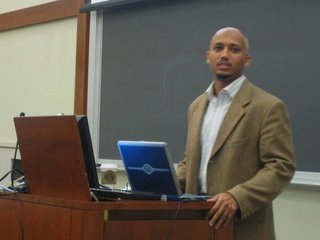 On behalf of Alif (Alliance Investment Fund) I would like to express my sincere appreciation to everyone that attended the “Seeds of Hope” event. The audience was a mixture of students, community members, organizers and faculty. The documentary and subsequent discussion on the plight of vulnerable populations in Ethiopia was engaging and thought provoking.
On behalf of Alif (Alliance Investment Fund) I would like to express my sincere appreciation to everyone that attended the “Seeds of Hope” event. The audience was a mixture of students, community members, organizers and faculty. The documentary and subsequent discussion on the plight of vulnerable populations in Ethiopia was engaging and thought provoking.I would like to thank Columbia University School of Social Work for providing us with the venue to facilitate this event. Additionally, the screening was a collaboration of the following organizations: Columbia University School of Social Work’s International Social Welfare Caucus, Tadias Magazine, United Nations Association - Midpenninsula Chapter, and Concentric Media.
Once again, thank you all for taking out the time to join us. Please feel free to contact me at nasir@allianceinvestment.org with any comments, suggestions and thoughts about the event, and visit Alif at www.allianceinvestment.org to find out how you can get involved in affecting change in the lives of marginalized children in Ethiopia.
I hope you will join Alif in its mission to invest in the lives of orphans and vulnerable children!
Nasir Al-Amin
"Investing in Our Shared Future"
Here are a few pictures from the event:
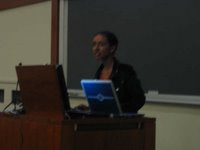
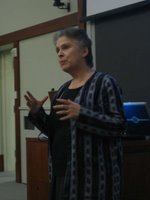

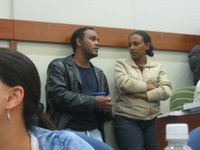
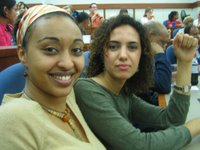

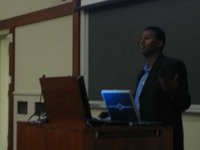
"SEEDS OF HOPE" Documentary
 SEEDS of HOPE is a series of documentary films about courageous efforts underway in Ethiopia to break the silence, encourage innovative approaches to prevention, and lift the stigma surrounding HIV/AIDS.
SEEDS of HOPE is a series of documentary films about courageous efforts underway in Ethiopia to break the silence, encourage innovative approaches to prevention, and lift the stigma surrounding HIV/AIDS.We meet activists, family members, neighbors, humanitarian groups, community activists, and health care professionals who work side by side to advocate for greater awareness and provide care.
Through the compassion and generosity of those whose actions are not only documented, but honored, the series conveys a message of empowerment and hope.Learn more about the series as well as download and/or purchase the series compilation at: www.concentricmedia.org/ethiopia
Saturday, September 09, 2006
An Ethiopian girl shines shoes to pay for school
Closing the gender gap: An Ethiopian girl shines shoes to pay for school
Via: UNICEF
By Andrew Heavens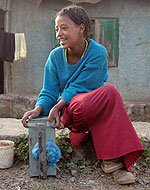
ADDIS ABABA, Ethiopia, 8 June 2006 – Meskerem Geremew knew she had to get an education. So the 12-year-old girl from Ethiopia’s bustling capital, Addis Ababa, decided to take action.
First she got hold of some rags and a cracked water container and set herself up as one of the city’s only shoeshine girls, holding her own against hundreds of competing shoeshine boys. Then she started saving, splitting her earnings between her mother and a special school-savings pot. On weekends and evenings after classes, Meskerem shines shoes for up to 1 birr (11 cents) a pair. On a good day, she can earn as much as 10 birr ($1.15). Half of that goes to buy food and other provisions for her family. The rest of her earnings are put toward school fees and related costs – 15 birr a month, or 154 birr for the whole year. After months of elbow grease, she collected enough to start paying her own way through primary school, while continuing to provide food for her mother and four younger siblings.
Today, Meskerem, spends the bulk of her weekdays sitting at a desk at Tebeb Mengel Primary School in the heart of the city, getting the lessons she paid for with her own money and using the exercise books and pens she bought through her own hard work.
“I had to go to school because I want to get knowledge,” said Meskerem. “Knowledge is how you become somebody
Via: UNICEF
By Andrew Heavens

ADDIS ABABA, Ethiopia, 8 June 2006 – Meskerem Geremew knew she had to get an education. So the 12-year-old girl from Ethiopia’s bustling capital, Addis Ababa, decided to take action.
First she got hold of some rags and a cracked water container and set herself up as one of the city’s only shoeshine girls, holding her own against hundreds of competing shoeshine boys. Then she started saving, splitting her earnings between her mother and a special school-savings pot. On weekends and evenings after classes, Meskerem shines shoes for up to 1 birr (11 cents) a pair. On a good day, she can earn as much as 10 birr ($1.15). Half of that goes to buy food and other provisions for her family. The rest of her earnings are put toward school fees and related costs – 15 birr a month, or 154 birr for the whole year. After months of elbow grease, she collected enough to start paying her own way through primary school, while continuing to provide food for her mother and four younger siblings.
Today, Meskerem, spends the bulk of her weekdays sitting at a desk at Tebeb Mengel Primary School in the heart of the city, getting the lessons she paid for with her own money and using the exercise books and pens she bought through her own hard work.
“I had to go to school because I want to get knowledge,” said Meskerem. “Knowledge is how you become somebody
Thursday, September 07, 2006
THE REPERCUSSIONS OF A DREAM DEFERRED: HOW A QUEST FOR PURITY LEAD TO A BROTHEL IN ETHIOPIA
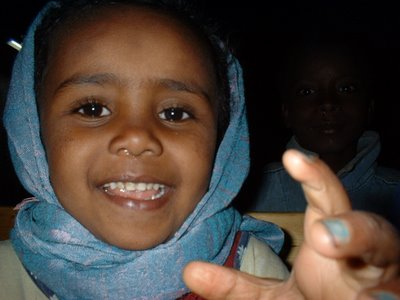
“Harlem: A Dream Deferred,”
by Langston Hughes
What happens to a dream deferred?
Does it dry up
like a raisin in the sun
Or fester like a sore—
And then run?
Does it stink like rotten meat?
Or crust and sugar over—
Like a syrupy sweet?
Maybe it just sags
like a heavy load.
Or does it explode?
THE REPERCUSSIONS OF A DREAM DEFERRED: HOW A QUEST FOR PURITY LEAD TO A BROTHEL IN ETHIOPIA
By Nasir Al-Amin
LANGSTON HUGHES, A giant during the Harlem Renaissance era and referred to as "the poet laureate of Harlem," penned the aforementioned poem “Harlem: A Dream Deferred” as well as coined the insightful phrase: "We have tomorrow right before us like a flame.” So its fitting that I’m writing this from my Harlem apartment about a defining moment, which I believe depicts “what happens to a dream deferred.”
One of my fondest memories of Ethiopia is hearing the Azan (the Muslim call to prayer) echoing through the streets of Addis Ababa summoning its faithful to prayer—“Allahu Akbar-Allaaaahu Akbar.” On one particular day, I found myself in a café with a friend when the soothing call came out, “Allahu Akbar-Allaaaahu Akbar.” I told my friend I needed to make wudu (the act of washing parts of the body with clean water performed by Muslims in preparation for prayer) so I went to the café’s restroom only to thank God for not dying of disgust given its filthiness. I returned to the table and told my friend I would be back later as I needed to make wudu somewhere else. My friend suggested that I go to the nearby movie theater, as its facilities are more modern and hygienic. In a rush, I darted out of the café towards the theater.
Once at the theater, I approached the attendant working the door and in my broken Amharic (language of Ethiopia) I requested to use the restroom, only to be turned away. However, after numerous attempts at trying to convince him that I just wanted to use the restroom he directed me to a hotel a block or so away. At this point I became a bit agitated, as all I could think of was: ‘I just want to make wudu and get to the mosque for prayer.’ Moments later, I reached the hotel and asked the Security Guard/Bouncer at the entrance to use the bathroom. After hearing my broken Amharic he dared not reply back to me in Amharic so he just turned and pointed up the steps. As I made my way to the top of the steps I’m confronted by another Security Guard/Bouncer—in Addis this is a common occurrence, as often in restaurants, hotels and/or places of business there is some sort of guard—who again after hearing my decrepit Amharic turned and gestured for me to pass him and continue up the winding steps. By now I really have tunnel vision, I could see this large fountain style sink at the top of the sidewalk that ran along the side of hotel rooms—as the hotel was a one story building that ran up a hill with all of its rooms on one side—and all I kept thinking was: ‘I just want to make wudu…all this just to make wudu…I just want to make wudu…’
Now as I begin to pass the first room I noticed a couple ahead of me entered one of the rooms. Again, at this point I’m not analyzing anything, nor observing my surroundings all thats running through my mind is: ‘I just want to make wudu and get to the mosque…all of this trouble to make wudu.’ As I continued to get closer to the large fountain I began to pass room after room until I came upon the fourth room. As I approached the door to pass, a young woman appeared at the rooms entrance standing at an angle that made the rooms content visible, as behind this scantly dressed girl, in nothing more than her panties and a bra, was about 20 to 25 teenage girls either in their panties and braw or not dressed at all. I turned my head and speedup my pace as I didn’t know how to process what I just saw.
Once at the top of the hill and at the fountain, I could hear in the distance the snickering of young voices, all in Amharic so I couldn’t make out what was being said. I glanced back and noticed that some of the girls had come out of the room in their skimpy clothing and were standing along the wall talking. I finished making wudu and began down the lone sidewalk towards the exit/entrance of the hotel. Although I know I was walking fast, it felt like I was an infant taking his first steps as the journey down the steps took an eternity. Once I got close to the room more girls had made their way out of the room only leaving those with no bras on at the door’s entrance. However, it wasn’t until I passed the door and got closer to the exit that I began to realize what I just witnessed.
My limited diction prevents me from finding the best word to describe that moment, that feeling. In Arabic the word and/or letters Ya’Sin are indefinable and thus uttered but not translated—the one who speaks it can not give its meaning. Similarly, this was an impalpable moment, a moment that can define and alter one’s purpose in life, evoke internal tears and set one adrift in a sea of ambiguity away from the shore of comfort and security, far from a place where everyone understands you, a place of toned voicelessness as one speaks but there is no resonance… as although one speaks one is unable to convey to the world…
by Langston Hughes
What happens to a dream deferred?
Does it dry up
like a raisin in the sun
Or fester like a sore—
And then run?
Does it stink like rotten meat?
Or crust and sugar over—
Like a syrupy sweet?
Maybe it just sags
like a heavy load.
Or does it explode?
THE REPERCUSSIONS OF A DREAM DEFERRED: HOW A QUEST FOR PURITY LEAD TO A BROTHEL IN ETHIOPIA
By Nasir Al-Amin
LANGSTON HUGHES, A giant during the Harlem Renaissance era and referred to as "the poet laureate of Harlem," penned the aforementioned poem “Harlem: A Dream Deferred” as well as coined the insightful phrase: "We have tomorrow right before us like a flame.” So its fitting that I’m writing this from my Harlem apartment about a defining moment, which I believe depicts “what happens to a dream deferred.”
One of my fondest memories of Ethiopia is hearing the Azan (the Muslim call to prayer) echoing through the streets of Addis Ababa summoning its faithful to prayer—“Allahu Akbar-Allaaaahu Akbar.” On one particular day, I found myself in a café with a friend when the soothing call came out, “Allahu Akbar-Allaaaahu Akbar.” I told my friend I needed to make wudu (the act of washing parts of the body with clean water performed by Muslims in preparation for prayer) so I went to the café’s restroom only to thank God for not dying of disgust given its filthiness. I returned to the table and told my friend I would be back later as I needed to make wudu somewhere else. My friend suggested that I go to the nearby movie theater, as its facilities are more modern and hygienic. In a rush, I darted out of the café towards the theater.
Once at the theater, I approached the attendant working the door and in my broken Amharic (language of Ethiopia) I requested to use the restroom, only to be turned away. However, after numerous attempts at trying to convince him that I just wanted to use the restroom he directed me to a hotel a block or so away. At this point I became a bit agitated, as all I could think of was: ‘I just want to make wudu and get to the mosque for prayer.’ Moments later, I reached the hotel and asked the Security Guard/Bouncer at the entrance to use the bathroom. After hearing my broken Amharic he dared not reply back to me in Amharic so he just turned and pointed up the steps. As I made my way to the top of the steps I’m confronted by another Security Guard/Bouncer—in Addis this is a common occurrence, as often in restaurants, hotels and/or places of business there is some sort of guard—who again after hearing my decrepit Amharic turned and gestured for me to pass him and continue up the winding steps. By now I really have tunnel vision, I could see this large fountain style sink at the top of the sidewalk that ran along the side of hotel rooms—as the hotel was a one story building that ran up a hill with all of its rooms on one side—and all I kept thinking was: ‘I just want to make wudu…all this just to make wudu…I just want to make wudu…’
Now as I begin to pass the first room I noticed a couple ahead of me entered one of the rooms. Again, at this point I’m not analyzing anything, nor observing my surroundings all thats running through my mind is: ‘I just want to make wudu and get to the mosque…all of this trouble to make wudu.’ As I continued to get closer to the large fountain I began to pass room after room until I came upon the fourth room. As I approached the door to pass, a young woman appeared at the rooms entrance standing at an angle that made the rooms content visible, as behind this scantly dressed girl, in nothing more than her panties and a bra, was about 20 to 25 teenage girls either in their panties and braw or not dressed at all. I turned my head and speedup my pace as I didn’t know how to process what I just saw.
Once at the top of the hill and at the fountain, I could hear in the distance the snickering of young voices, all in Amharic so I couldn’t make out what was being said. I glanced back and noticed that some of the girls had come out of the room in their skimpy clothing and were standing along the wall talking. I finished making wudu and began down the lone sidewalk towards the exit/entrance of the hotel. Although I know I was walking fast, it felt like I was an infant taking his first steps as the journey down the steps took an eternity. Once I got close to the room more girls had made their way out of the room only leaving those with no bras on at the door’s entrance. However, it wasn’t until I passed the door and got closer to the exit that I began to realize what I just witnessed.
My limited diction prevents me from finding the best word to describe that moment, that feeling. In Arabic the word and/or letters Ya’Sin are indefinable and thus uttered but not translated—the one who speaks it can not give its meaning. Similarly, this was an impalpable moment, a moment that can define and alter one’s purpose in life, evoke internal tears and set one adrift in a sea of ambiguity away from the shore of comfort and security, far from a place where everyone understands you, a place of toned voicelessness as one speaks but there is no resonance… as although one speaks one is unable to convey to the world…
what happens when a dream is deferred.
Awakening: Ambiguity Fosters Clarity (Re-Published)
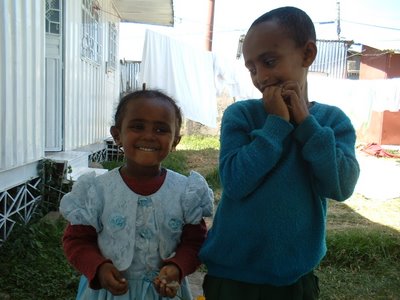 Awakening: Ambiguity Fosters Clarity
Awakening: Ambiguity Fosters Clarityby: Nasir Al-Amin
Ethiopia was a moment of awakening. It brought the numbers to life; the figures (4.6 million orphans, and 200,000 children living on the streets of Addis) became tangible. The words (domestic workers, poverty, commercial sex workers, child labourers, orphans, under-five mortality rate, and beggars) were now faces, individuals that I built relationships with, people I ate and laughed with, people I hugged and lent a shoulder to in moments of sorrow. In essence, my reality had changed. My perspective and/or worldview was altered by the realty of others. The children and their families became the center. My life, rather my life’s purpose was no longer about me. And it was this shift that nurtured a dormant seed of discontent that subsequently, led to a year of isolation, self-reflection and reprioritization.
After I returned to the States, for the first few months I isolated myself (at first unknowingly) from friends (especially my Ethiopian friends) and environments (Ethiopian restaurants and cafés) that at best reminded me of Ethiopia and at worst subjected me to that dreaded question: “How was Ethiopia?” As Ethiopia was no longer this tranquil place, an escape from America’s dominant culture and norms, a bastion of generosity and love, my on little gem, this utopia that the West had not conquered or found. Ethiopia (both figuratively and literally) in all it splendor had changed and I could no longer articulate this new reality. My life experiences, Columbia diction and education could not prepare me for the emotional component of my endeavor. The veil had been removed, and what I saw left me speechless.
What words can speak to the reality of desperate girls walking the streets at night selling their bodies, or a teenage mother and her baby after a day of begging trying to sleep and stay warm on the sidewalk wrapped in tattered and soiled blankets—shockingly, often one sees groups of street children huddled together employing body heat as their sole means of staying warm. How does one express that somber feeling when children run to your vehicle at traffic lights placing their hands and faces on the car window with a dismal gaze begging for food or coins?
Unfortunately, for some Ethiopians living abroad and in Ethiopia, this reality has become normalized and thus they have become desensitized to the destitute and their plight. So much so that when they speak of Ethiopia and/or their trip back to Ethiopia the latter (destitute families and children) are not apart of the discussion—for instance, some will rave over the industrial improvements of Addis (which is laudable), yet fail to recognize that the conditions that give rise to street children, prostitution, child labour and exploitation have failed to improve. How do I reconcile these two worlds? How do I express to people that their $5-$10 dollar a week Starbucks addiction could change the life of a child begging on the streets of Addis, as this same amount of money could take a child from the streets into the classroom, and secure food, a school uniform and supplies. How do I convey to people that the cost of clubbing (and its associated cost: dinner, drinks…etc) two nights a week if collected at the end of one month, could prevent an uneducated and desperate girl from resorting to prostitution for a year.
TO BE CONTINUED…
Thursday, August 10, 2006
Obstacles to Education
 It cost $5 for one girl’s uniform and only $4 for one boy’s uniform!
It cost $5 for one girl’s uniform and only $4 for one boy’s uniform!In Ethiopia, school enrollment is based on a number of conditions. Two of these conditions are that students must have a school uniform and pay the tuition fee. Unfortunately, these conditions prohibit orphans and vulnerable children from poverty-stricken families from enrolling in school. Thus, one of the aims of Project FACE is to alleviate this barrier to education for orphans and vulnerable children.
A detailed breakdown of the cost associated with covering the cost of school uniforms, materials (an exercise book, pencils, and erasers), tuition fees, and backpacks are as follows:
School Support for Girls
Number of beneficiaries: 4
Uniform 1-girl: ($5.00) 4-girls: ($20.00)
Stationary: 1-girl: ($3.00) 4-girls: ($12.00)
Backpack: 1-girl: ($4.00) 4-girls: ($16.00)
Tuition Fee: 1-girl: ($3.00) 4-girls: ($12.00)
Total:
12-Months 1-girl ($15.00) 4-girls ($60.00)
School Support for Boys
Number of beneficiaries: 3
Uniform 1-boy: ($4.00) 3-boys: ($12.00)
Stationary: 1-boy: ($3.00) 3-boys: ($9.00)
Backpack: 1-boy: ($4.00) 3-boys: ($12.00)
Tuition Fee: 1-boy: ($3.00) 3-boys: ($9.00)
Total:
12-Months 1-boy ($14.00) 4-boys ($42.00)
Please join Alliance (http://www.allianceinvestment.org/) in affording orphans and vulnerable children in Ethiopia with the opportunity to attend school!

Tuesday, August 08, 2006
HOW YOU CAN INVEST IN THE FUTURE OF A CHILD!
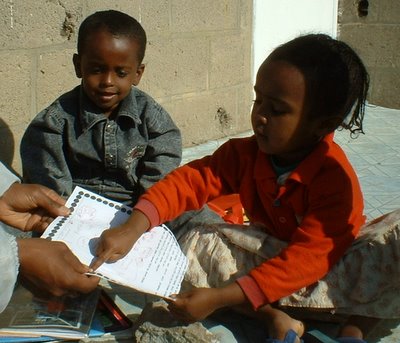 Operating Expenses for 6-months and 12-months
Operating Expenses for 6-months and 12-monthsScholarship for Girls
# of participants: 4
6-months: $480.00
12-months: $960.00
Breakdown:
Daily 1-girl: ($0.66) 4-girls: ($2.64)
Monthly 1-girl ($20.00) 4-girls ($80.00)
6-Months 1-girl ($120.00) 4-girls ($480.00)
12-Months 1-girl ($240.00) 4-girls ($960.00)
Scholarship for Boys
# of participants: 3
6-months: $360.00
12-months: $720.00
Breakdown:
Daily 1-boy: ($0.66) 3-boys: ($1.98)
Monthly 1-boy: ($20.00) 3-boys: ($60.00)
6-Months 1-boy: ($120.00) 3-boys: ($360.00)
12-Months 1-boy: ($240.00) 3-boys: ($720.00)
School Support (girls)
# of participants: 4
6-months: -
12-months: $52.51
Breakdown:
These funds are for school uniforms for 4 girls. In Ethiopia a child can not attend school if he or she does not have a school uniform.
School Support (boys)
# of participants: 3
6-months: -
12-months: $35.95
Breakdown:
These funds are for school uniforms for 3 boys. In Ethiopia a child can not attend school if he or she does not have a school uniform.
Total Support (including Scholarship and School Support):
# of participants: 7
6-months: $840.00 ($480.00 + $360.00)
12-moths: $1,768.46 (960.00 + $720.00 + $88.46)
Tuesday, August 01, 2006
FAMILY AND CHILD ENRICHMENT PROGRAM (FACE)--ETHIOPIA
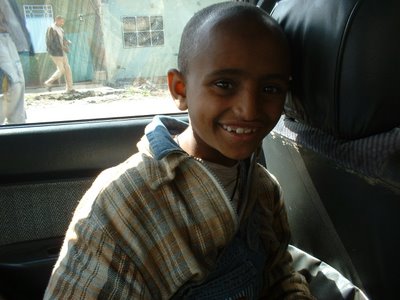 PROJECT FACE:
PROJECT FACE:CASE STATEMENT
In Ethiopia, formal education is restricted to families that can afford the cost of uniforms, school materials, and books. For the 150,000 to 600,000 child laborers living and working on the streets of Ethiopia, obtaining a formal education is a faint possibility.One of the fundamental causes of child labor is extreme poverty. Poor families in Ethiopia like in other developing countries, engage their children in child labor in order to confront the immediate impact of poverty—the inability to secure basic necessities such as food, shelter, clothing and medicine. In essence, the child's economic contribution is vital to the survival of impoverished families.
Poor parents are cognizant of the fact that educating their children would increase their future earning potential and standard of living, yet poverty-stricken families are unable to afford the “luxury” of forgoing their children’s contribution to the family income. Subsequently, a conflict evolves between the short-term economic interests of the family and the long-term interests of the child.In response to this conflict and the increasing number of children who have their right to education denied, the Family and Child Enrichment Program (FACE) was created.
MISSION OF FACE
The mission of FACE is to ensure that orphaned and vulnerable children (OVC) from poverty-stricken and HIV/AIDS affected families have sufficient means and resources to complete their education, as well as to ensure these families have the proper financial assistance to confront the immediate impact of poverty.
OUR APPROACH
Under FACE monetary assistance is provided in the form of a monthly scholarship to OVC from poverty-stricken and/or HIV/AIDS affected families. These families with school age children (4 to18 years old) are allocated scholarships on the condition that their children are enrolled in school, maintain a monthly attendance of 90%—(no more that 2 absences per month), and go for periodic medical check ups. The purpose of the scholarship is threefold:
1. To defray the short-term impact of poverty: the inability to secure basic necessities such as food, shelter, clothing and medicine;
2. To off-set the opportunity cost of sending children to school—the value of work the child would perform if he or she were not in school;
3. To defray the indirect costs imposed on poor families—school supplies, school uniforms and transportation.
Consistent with our aim to empower women, participating families will have an account opened in the mother’s name, so that the monthly scholarship can be distributed directly to the mother’s account. Empirical research (IFPRI Perspectives, 2002) indicates that “when women control assets, expenditures on children’s education increase and the rate of illness among girls drops.”FACE beneficiaries are provided with a uniform and school supplies, in addition to having their registration and tuition fees covered. The monthly amount of the scholarship is 174 Ethiopian Birr ($20) for both girls and boys.
To learn more and/or get involved with Project FACE go to www.allianceinvestment.org
Monday, July 31, 2006
PHILANTHROPIC CONTRIBUTION
 I would like to acknowledge the philanthropic contribution of Fuad Musa. After my speech at 2006 Badr Conference Fuad approached me and on behalf of his company, FuFu Products, he donated 40 beautiful mugs with the simple condition that all the proceeds go to the orphans and vulnerable children I work with in Ethiopia. Due to his altruism and the compassion of the Ethiopian Muslim community, I was able to raise enough funds to support two of the kids in Project FACE for a year.
I would like to acknowledge the philanthropic contribution of Fuad Musa. After my speech at 2006 Badr Conference Fuad approached me and on behalf of his company, FuFu Products, he donated 40 beautiful mugs with the simple condition that all the proceeds go to the orphans and vulnerable children I work with in Ethiopia. Due to his altruism and the compassion of the Ethiopian Muslim community, I was able to raise enough funds to support two of the kids in Project FACE for a year.The children I work with through Project FACE are kids who have lost one or both of their parents to HIV/AIDS, children who are engaged in child labor, children who have inherited a life of poverty, children with limited opportunities for the future. Fuad’s support will allow me to help these children secure their most basic needs: food, clothing and shelter.
Fuad and those who purchased the mugs are an inspiration and exemplify the generosity needed to affect change in the lives of some of the Ethiopia’s most vulnerable children.
Please accept my sincere gratitude,
Nasir Al-Amin
Sunday, July 30, 2006
BADR CONFERENCE
 BADR CONFERENCE:SPEAKING ENGAGEMENT
BADR CONFERENCE:SPEAKING ENGAGEMENTI would like to give my sincere appreciation to the First Hijrah Foundation (FHF) for affording me the opportunity to speak about the plight of Orphans and Vulnerable Children (OVC) to the Ethiopian Muslim communities of North American and Canada that convened in Vienna, Virginia for the 2006 Badr Conference. I hope that I was able to convey the realities of vulnerable children and inspire the community into action!
Sincerely,
Nasir Al-Amin
Thursday, July 27, 2006
Yemeni children smuggled to Saudi
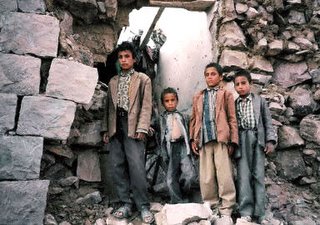
VIA: Middle East Online
Poverty-stricken parents encourage trafficking of their children from Yemen to Saudi Arabia to work as beggars.
By Christian Chaise - SANAA
Misery in Yemen continues to encourage child trafficking into Saudi Arabia, with widespread cases of parents paying smugglers to take on their offspring to work as beggars on the streets of the oil-rich neighbour. Thousands of children, as young as seven and including girls, continue to be entrusted by their parents to traffickers who help the youngsters cross the desert borders illegally into Saudi Arabia, UN officials said. The children, who mostly come from large and poor families, sweat to earn money through small, menial jobs or most often by begging on the streets. Thousands of them are regularly caught by Saudi police and sent back home.
Trafficking mostly feeds on extreme poverty in northern Yemen, particularly in the province of Hajjar which is close to the Saudi border.
"Now families are paying smugglers to take their children to Saudi Arabia," Ramesh M. Shrestha, a representative of the United Nations Children's Fund (UNICEF), said. "We've heard of agreements between traffickers and parents with government officials as witnesses to make sure the traffickers will pay," he said. He said "each kid is sending 200 to 500 dollars to their family each month," in a country where annual revenues per capita are just a bit more than 500 dollars. The alarming situation has prompted UNICEF and the Yemeni ministry of social affairs to organise the country's first conference on the subject in Sanaa in January. It was the first time that Yemeni authorities officially admitted the problem, most probably because it constituted negative publicity for the country.
Prime Minister Abdel Kader Bajammal however still insists that trafficking of children - words that authorities do not like to use to refer to the problem - involved only "cases, not (a) big quantity." Shrestha also said that the situation was even more complicated by the fact that many children were also illegally brought into Saudi Arabia from Yemen by their own parents.
In the first quarter of 2004, more than 150,000 Yemenis, including 9,815 children, were expelled from Saudi Arabia. The number of those who were victims of trafficking however is not known. Most of the Yemeni children smuggled into Saudi Arabia were boys aged between 10 and 16, said Shrestha.
The Yemeni Centre for Social and Labour Studies said in a study that "the child trafficking problem is one which, though it did not originate at that specific time and might be very old, became significant as a result of the Gulf crisis (war) of 1990-91." "Due to the opposition of the Yemeni government to the Saudi cooperation with America and the allies against the Iraqi regime of Saddam Hussein, Saudi Arabia repatriated many Yemeni migrant workers and since then, there has been greater difficulty in legally obtaining employment in Saudi Arabia," it said.
Shrestha said that another main hurdle obstructing efforts to curb the problem is that "in Yemeni criminal law, there is no mention of trafficking of human beings. So it is not legal or illegal." "Even when traffickers are caught, they are released, because it is not illegal," he said, calling for legal amendments. Shrestha said that another main problem that encourages the trafficking of children is the miserable state of the educational system. School may be mandatory in Yemen, but only 80 percent of children actually enroll. With half of the 20 million population under 18 years old, Yemen only has 13,000 schools, among them 800 for girls.
"I am really not so sure what is feasible in the short term and in the long term," added Shrestha.
Tuesday, July 25, 2006
More than 600 children die every day
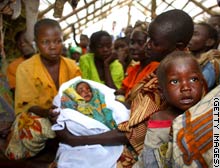 VIA: CNN World
VIA: CNN WorldReport: Congolese children bear brunt of war LONDON, England (AP) -- More than 600 children die every day in war-ravaged Congo and even more are displaced, sexually abused and swept up into the camps of combatant groups, according to a UNICEF report released Monday.
Martin Bell, a former war correspondent and UNICEF ambassador, wrote "Child Alert: Democratic Republic of Congo." The report was released less than a week before the country's elections, the first democratic ballot in more than 40 years.
"It is easy to be overwhelmed by what has happened in DRC [Congo] because of the sheer scale of it," Bell said. "But we owe it to the children to give them the future they deserve. ... These elections may be the opportunity of their lifetime." The United Nations is helping organize the July 30 vote, the biggest elections the world organization has ever undertaken. Its biggest peacekeeping force of 17,600 troops and a recently arrived European Union force of 1,000 soldiers are deployed to maintain calm at 50,000 ballot stations, scattered across a country the size of Western Europe with only a few hundred miles (kilometers) of paved roads.
Thirty-three candidates are running for president and 9,000 for legislative seats, but many are asking to have the campaign suspended until charges of campaign cheating, backed by several human rights groups, are investigated.
Bell presented the report in central London with Tony Bloomberg, UNICEF representative for Congo, at the University of London's School of Oriental and African Studies.
The two discussed bolstering support for education and schools, which UNICEF sees as a path to reintegrate child soldiers and molestation victims as young as 6 back into a stable community.
"The role of the school here is very important -- a normalized school environment not only helps the child in terms of trauma, but it also gives them a tool for the future," Bloomberg said. "It gives them hope."
UNICEF estimates Congolese rape and sexual assault victims number in the hundreds of thousands -- epidemic proportions because of combatant groups deploying sexual violence as a weapon of war.
"They [children] are caught up in war as refugees and internally displaced people: Constant migration robs them of schooling, health care and the chance for a normal life," the report says. "And they are caught up in combat as soldiers and camp followers."
Young girls are singled out for sexual crimes, the report states, due to false beliefs that having sex with them will cure HIV/AIDS.
An estimated 1.1 million people now live with the disease in the Congo -- a number UNICEF says will only climb as war, gang rape, genital mutilation and community displacement continue to wrack the country.
The report also states that more children under the age of 5 die every year in Congo than in either China -- a country with 23 times the population -- or in all the Latin American countries combined.
"Children bear the brunt of conflict, disease and death, but not only as casualties," Bloomberg said. "They are also witnesses to, and sometimes forced participants in, atrocities and crimes that inflict physical and psychological harm."
Images of the Most Vulnerable
Via: CNN
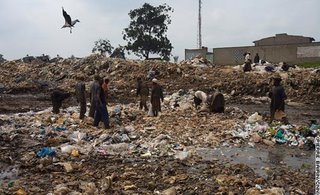
People and vultures compete over scraps in the main garbage dump of Nairobi, Kenya.
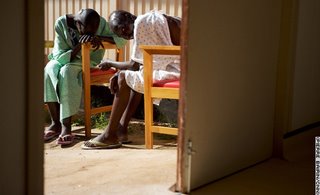
There are more than three million people in Kenya infected with HIV/AIDS, and more than two million have died of AIDS-related complications, according to Kenya's National AIDS Control Council.
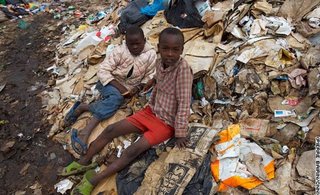
The people who live in Nairobi's slums often collect plastic bags from the dump and sell them for a few cents.
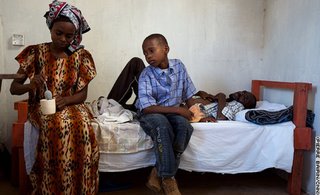
Fatma prepares food for her husband, Hussein, who is dying of AIDS, while their 11-year-old son Mukhtar watches. Fatma also is infected with AIDS.
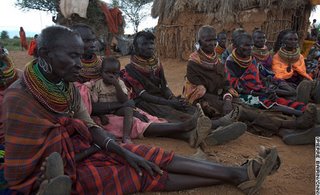
There are as many as one million AIDS orphans in Kenya, and grandmothers are often the only ones left to care for the children. The disease has destroyed even indigenous communities deep in the Kenyan countryside -- such as the Masai community shown here.
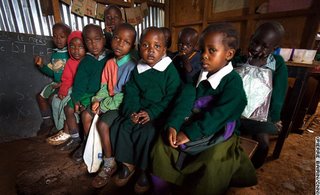
Children sit in class at the Stara Rescue School in the Kibera slum of Nairobi, Kenya. Of the 470 children in the school, approximately 70 percent are AIDS orphans.
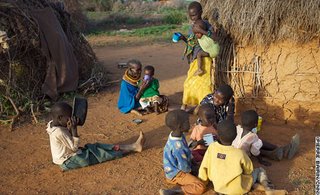
Masai grandmothers struggle to find food for their orphaned grandchildren.
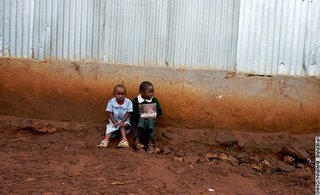
Many AIDS orphans are themselves HIV positive.

People and vultures compete over scraps in the main garbage dump of Nairobi, Kenya.

There are more than three million people in Kenya infected with HIV/AIDS, and more than two million have died of AIDS-related complications, according to Kenya's National AIDS Control Council.

The people who live in Nairobi's slums often collect plastic bags from the dump and sell them for a few cents.

Fatma prepares food for her husband, Hussein, who is dying of AIDS, while their 11-year-old son Mukhtar watches. Fatma also is infected with AIDS.

There are as many as one million AIDS orphans in Kenya, and grandmothers are often the only ones left to care for the children. The disease has destroyed even indigenous communities deep in the Kenyan countryside -- such as the Masai community shown here.

Children sit in class at the Stara Rescue School in the Kibera slum of Nairobi, Kenya. Of the 470 children in the school, approximately 70 percent are AIDS orphans.

Masai grandmothers struggle to find food for their orphaned grandchildren.

Many AIDS orphans are themselves HIV positive.
Subscribe to:
Posts (Atom)




